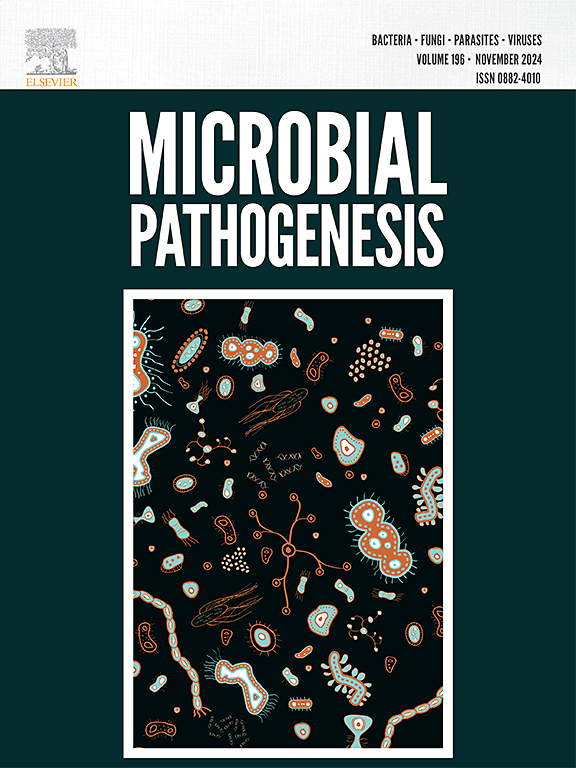刚地弓形虫感染与关节炎的关联:来自横断面研究和遗传流行病学分析的见解
IF 3.5
3区 医学
Q3 IMMUNOLOGY
引用次数: 0
摘要
刚地弓形虫(弓形虫)是一种普遍存在的原生动物,感染了三分之一的人类,具有复杂的免疫调节特性。虽然实验模型表明在炎症调节中的矛盾作用,但将弓形虫与关节炎联系起来的流行病学数据仍然不确定,遗传因果关系尚未探索。这项多学科研究结合了人口流行病学和遗传流行病学来阐明这种关系。方法对来自NHANES的17029名美国成年人进行分析,采用复杂调查加权进行多变量调整logistic回归。通过连锁不平衡评分回归(LDSC)评估遗传相关性,并辅以双向双样本孟德尔随机化(MR),利用GWAS数据对三种弓形虫血清学标志物(IgG, p22, sag1)和关节炎表型进行分析。经多变量调整后,弓形虫IgG血清阳性与关节炎患病率显著相关(OR = 1.19, 95% CI: 1.03-1.38)。种族差异明显,特别是在非西班牙裔白人中,关节炎、类风湿关节炎(RA)和骨关节炎(OA)的总体差异(均p < 0.05)。LDSC和正向MR显示弓形虫感染与关节炎表型风险无遗传相关性或因果关系(均P >; 0.05)。反向MR显示RA (OR = 0.92, 95% CI: 0.87-0.98)和OA (OR = 0.63, 95% CI: 0.44-0.88)中弓形虫sag1 IgG水平降低,提示抗寄生虫体液免疫功能受损。我们的研究揭示了一个复杂的双重性:在特定人群中,慢性弓形虫暴露与关节炎易感性相关,而遗传证据提出了一种范式转换机制——关节炎的自身免疫失调可能会损害抗寄生虫抗体反应。这种双向关系促进了我们对感染-自身免疫串扰的理解,对风湿病护理中寄生虫合并感染的管理具有重要意义。本文章由计算机程序翻译,如有差异,请以英文原文为准。
Association of infection with Toxoplasma gondii and arthritis: Insights from a cross-sectional study and genetic epidemiology analysis
Background
Toxoplasma gondii (T. gondii), a ubiquitous protozoan infecting one-third of humanity, exhibits complex immunomodulatory properties. While experimental models suggest paradoxical roles in inflammation regulation, epidemiological data linking T. gondii to arthritis remain inconclusive, and the genetic causality unexplored. This multidisciplinary study integrates population epidemiology with genetic epidemiology to elucidate this relationship.
Methods
Analyzing 17,029 U S. adults from NHANES, we performed multivariable-adjusted logistic regression with complex survey weighting. Genetic correlations were assessed via linkage disequilibrium score regression (LDSC), complemented by bidirectional two-sample Mendelian randomization (MR) using GWAS data for three T. gondii serological markers (IgG, p22, sag1) and arthritis phenotypes.
Results
T. gondii IgG seropositivity showed significant association with arthritis prevalence after multivariable adjustment (OR = 1.19, 95 % CI:1.03–1.38). Racial disparities were prominent, particularly in non-Hispanic whites across overall arthritis, rheumatoid arthritis (RA), and osteoarthritis (OA) (all Pinteraction<0.05). LDSC and forward MR revealed no genetic correlation or causal effect of T. gondii infection on arthritis phenotypes risk (all P > 0.05). Reverse MR demonstrated reduced T. gondii sag1 IgG levels in RA (OR = 0.92, 95 % CI:0.87–0.98) and OA (OR = 0.63, 95 % CI:0.44–0.88), suggesting impaired anti-parasitic humoral immunity.
Conclusion
Our study reveals a complex duality: while chronic T. gondii exposure correlates with arthritis susceptibility in specific populations, the genetic evidence proposes a paradigm-shifting mechanism - autoimmune dysregulation in arthritis may compromise anti-parasitic antibody responses. This bidirectional relationship advances our understanding of infection-autoimmunity crosstalk, with critical implications for managing parasitic co-infections in rheumatological care.
求助全文
通过发布文献求助,成功后即可免费获取论文全文。
去求助
来源期刊

Microbial pathogenesis
医学-免疫学
CiteScore
7.40
自引率
2.60%
发文量
472
审稿时长
56 days
期刊介绍:
Microbial Pathogenesis publishes original contributions and reviews about the molecular and cellular mechanisms of infectious diseases. It covers microbiology, host-pathogen interaction and immunology related to infectious agents, including bacteria, fungi, viruses and protozoa. It also accepts papers in the field of clinical microbiology, with the exception of case reports.
Research Areas Include:
-Pathogenesis
-Virulence factors
-Host susceptibility or resistance
-Immune mechanisms
-Identification, cloning and sequencing of relevant genes
-Genetic studies
-Viruses, prokaryotic organisms and protozoa
-Microbiota
-Systems biology related to infectious diseases
-Targets for vaccine design (pre-clinical studies)
 求助内容:
求助内容: 应助结果提醒方式:
应助结果提醒方式:


